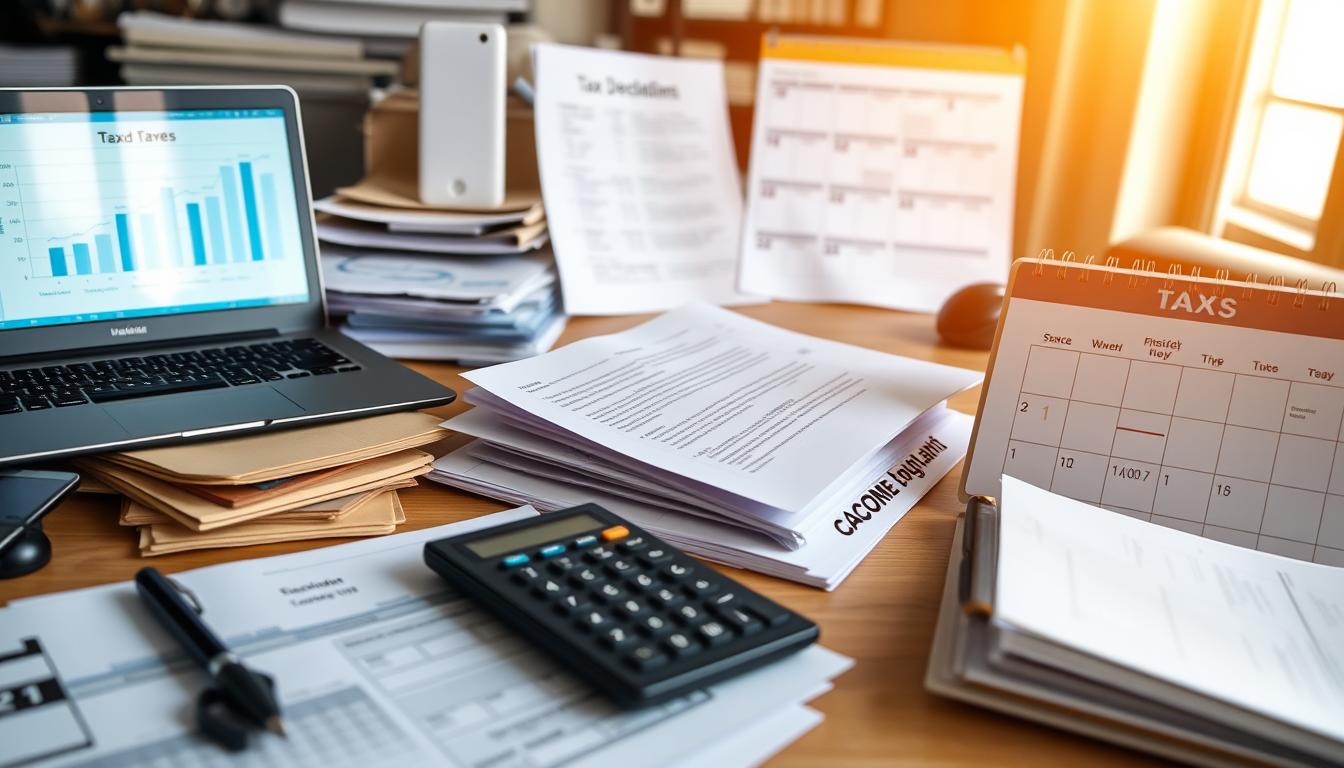When tax season comes, many people rush to get their documents in order they try to understand complex rules and meet deadlines. But, planning for taxes all year can make things easier and save you money. This guide will show you how to stay organized and ready for tax season all year.
Planning for taxes all year helps you manage your finances better. It lets you use deductions and credits you might miss otherwise. Being proactive can avoid costly errors and save you money. This advice is for anyone, whether you run a business, work as a freelancer or just have a regular job.
What is Tax Season Fundamentals?
As tax season gets closer, knowing the basics is key. This includes important deadlines, necessary documents, and deductions. We’ll cover all you need to know for tax planning and preparation.
Key Tax Deadlines Throughout the Year
It’s vital to remember tax filing deadlines. This helps avoid penalties and makes tax season easier. Here are some dates to mark:
- January 31st: W-2 and 1099 forms must be sent out
- April 15th: Tax returns are due (unless you file an extension)
- June 15th: Self-employed individuals must pay estimated taxes
- October 15th: Extended tax returns are due
Essential Tax Documents to Maintain
Keep detailed records of your finances all year. You’ll need these documents for tax filing:
- W-2 forms from your employers
- 1099 forms for freelance and investment income
- Receipts for itemized deductions like mortgage interest and charitable donations
- Records of tax credits, like the Earned Income Tax Credit
Common Tax Deductions and Credits
Learning to save on taxes is crucial. Here are some common deductions and credits:
- Itemized deductions for mortgage interest and charitable donations
- The standard deduction for those who don’t itemize
- Tax credits for education, child care, and home improvements
By grasping these basics, you’ll be ready for a smooth tax season.
Creating a Tax Season Year-Round Strategy
Effective tax planning is not just for filing season. It’s a year-round effort. By being proactive, you can use deductions and credits to lower your taxes. A good strategy includes organizing your finances and keeping records.
To make a great tax plan, follow these steps:
- Organize your financial records: Keep all tax documents in order. This makes filing easier and ensures you have what you need.
- Review tax-efficient strategies: Look for ways to save on taxes. This could be through deductions, tax-advantaged accounts, or credits. A tax pro can help find the best options for you.
- Stay informed about changes in tax laws: Tax laws change often. Keep up with these changes to adjust your plan as needed.
- Maintain regular communication with your tax professional: Work with your tax advisor all year. They can help you find tax savings and keep you on track.
With a solid year-round tax plan, you can manage your taxes better. This means less tax liability and a smoother filing season. Regular organization and smart tax practices can really pay off.
Digital Tools and Software for Tax Organization
As tax season gets closer, it’s key to have a good system for your financial papers and receipts. Luckily, many digital tools and software can make tax prep easier. They help you keep track of expenses and store important documents safely.
Best Tax Management Apps
Apps like TurboTax and H&R Block make tax filing simpler. They help with tracking expenses, organizing digital receipts, and finding deductions. These apps make it easy to manage your taxes all year.
Document Scanning and Storage Solutions
Keeping your tax documents organized is crucial. Digital scanning and cloud storage, like Google Drive or Dropbox, are great for this. They let you access your files from anywhere, keeping them safe and easy to find during tax season.
Financial Tracking Software Recommendations
Apps like Mint and YNAB are great for managing your money all year. They connect to your bank accounts and credit cards, giving you a clear view of your spending. This helps you get ready for tax time and find deductions or credits.
Using these digital tools and software can make tax prep easier and keep you organized all year. Let technology help you simplify your tax season and make filing less stressful.
Monthly Tax Planning Checklist
Staying on top of tax tasks all year can make tax season easier. A monthly tax planning routine helps you stay organized. It lets you track your income and expenses and use all deductions and credits. This checklist will keep you on track with your tax tasks.
Monthly Financial Review
Check your income and expenses each month. This means tracking your earnings and any financial changes. It also helps you categorize your spending. This is key for income tracking and expense categorization, making tax prep easier.
Organize Tax-Related Documents
Watch your tax documents like pay stubs and receipts. Keep them in a system, either physical or digital. This makes tax preparation tasks smoother and keeps your info ready.
Update Financial Records
Keep your financial records up to date. This includes any changes to your income or deductions. It helps with your monthly financial review and keeps your tax prep accurate.
Schedule Regular Tax Planning Meetings
- Make time each month for tax review and adjustments.
- Get advice from a tax pro if you’re unsure about your finances.
- Keep up with tax law changes that might affect your planning.
By using this monthly checklist, you can stay ahead of your tax prep. This means a stress-free tax season and more savings.
Working with Tax Professionals Throughout the Year
Taxes can be tough to understand, but tax pros can help a lot they are great for small business owners, wealthy people, or anyone wanting to save on taxes. Talking to tax advisors, CPAs, or tax attorneys is a smart move.
When to Consult a Tax Expert
There are times when you should talk to a tax pro. These include:
- Significant life changes, such as getting married, having a child, or buying a home
- Starting a new business or expanding an existing one
- Experiencing a major income or asset change, such as a job loss, inheritance, or investment portfolio growth
- Preparing for retirement or navigating complex financial planning scenarios
- Dealing with IRS audits or tax disputes
Choosing the Right Tax Professional
Choosing a tax advisor, CPA, or tax attorney is important. Look for someone who knows your tax situation well. They should be licensed, up-to-date on tax laws, and have a good track record.
Cost-Benefit Analysis of Professional Tax Services
Professional tax services might seem expensive, but they’re worth it. Tax pros can find deductions, lower your taxes, and keep you legal. They can save you more in taxes than their cost.
Quarterly Tax Planning and Review
Keeping up with your tax duties all year is key, especially for those who work for themselves or own small businesses. By planning and reviewing your taxes every quarter, you can better guess how much you owe. This helps you stay on track for the tax season ahead.
Looking over your financial reports and guessing your income and costs helps you get your quarterly tax payments right. This way, you can pay on time and avoid extra fees from the IRS. Also, tracking your business and self-employment taxes helps you find ways to save on taxes.
Planning your taxes every quarter is also a chance to check if your tax plan still fits your needs. As your business or personal life changes, so might your tax needs. A tax expert can help keep your plan up to date and in line with your goals.



